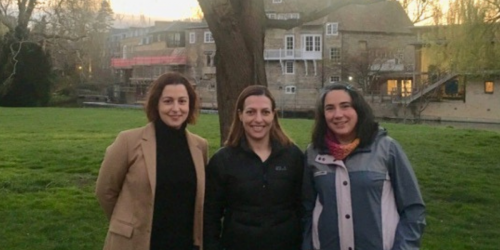
Lucy Postdocs co-found leadership programme supporting the next generation of women researchers
Meet the founders of StepWide and hear from them about the programme’s main goals
Lucy’s Postdoc Dr Julia Mueller tells us about her key motivations in pursuing a research career
Ever since I completed a research internship at the Dementia Collaborative Research Centre at the University of New South Wales in Sydney, Australia (back in 2011 during my undergrad in Psychology) I have known I wanted to pursue a career in academia. I had completed several internships in more practical fields of psychology previously (and I would recommend these types of experiences to anyone trying to decide their career path!), but only found my true passion during the research internship. A post-doc is essential to a research-focussed career path in academia because it enables you to work with and learn from other people and develop your expertise and skills. My PhD was a stand-alone project, which meant I had plenty of autonomy, but it was sometimes a bit isolating. With my current postdoctoral position, I can work with and learn from the best in the field, and I can observe and become involved in wider processes that are relevant to research, such as grant writing. This will help me establish myself as an independent researcher, which is my ultimate goal.
A key motivation for me is the applied nature of my research. Although I appreciate the need for basic science alongside more applied research, I personally am more motivated to conduct research when I know how my findings could be applied to the real world to directly improve people's health and wellbeing. To me, one of the main attractions of my current post was its focus on developing cost-effective, scalable, feasible solutions that can be delivered in a healthcare context. The emphasis is on making small but realistic changes with clinically meaningful impacts to help improve the lives of people with type 2 diabetes (or those at risk).
Another powerful motivator is my affinity for problem-solving. I enjoy the process of identifying complex problems, understanding them, and finding solutions. This process is central to any form of research, whether you are analysing data or trying to make sense of extant literature. I think if I did not enjoy this, I would quickly become frustrated and demotivated.
Ultimately, the aim of my research is to help us understand how individual-level factors such as cognitions and emotions shape eating behaviour, and how this can be translated into effective yet scalable solutions that can be implemented in practice to help people better manage their weight.
I chose Lucy Cavendish College because what I read about the college on the website and on various other sites resonated very strongly with me. LCC has a strong focus on making a difference, having a positive impact on society, and tackling the complex global challenges facing us in the 21st Century.
As the college of choice for individuals from non-traditional backgrounds, and as a college with an interdisciplinary academic community, it offers a thriving and diverse environment. I am a ‘Third Culture Kid’, having grown up in Tanzania and Namibia due to my parents’ work in development cooperation. I feel most happy and inspired when surrounded by people from different backgrounds and I enjoy the exchange and learning this involves.
If all that had not convinced me, I heard from multiple sources that LCC has an incredibly friendly, open and supportive community, which is a really strong selling point for me.
About Julia
Julia is a Research Associate within the Programme on Prevention of Diabetes and Related Metabolic Disorders in High Risk Groups in the MRC Epidemiology Unit. She is currently leading the quantitative analysis on an NIHR Programme Grant for Applied Research (PGfAR), developing and evaluating scalable behavioural weight management programmes for the prevention and treatment of type 2 diabetes. Julia's research to date revolves around the management and prevention of noncommunicable diseases such as cancer, chronic respiratory diseases, diabetes and obesity, with a particular interest in the potential of technology to support healthy lifestyles and disease self-management. Her background is in Health Psychology (Bsc Psychology, MSc Health Psychology). Her PhD and subsequent postdoc at the University of Manchester explored the role of technology in chronic respiratory conditions, and involved interdisciplinary work between the School of Health Sciences and the School of Computer Science. Since joining the MRC Epidemiology Unit in May 2020, Julia's research focuses on evaluating the effectiveness of using non-specialists and technology to deliver behavioural weight management programmes to people with type 2 diabetes (or those at risk). Additionally, she is exploring the relationship between executive functions (such as working memory) and eating behaviour.
Recently published book on "Developing Medical Apps and mHealth Interventions": http://www.springer.com/978-3-030-47498-0

Meet the founders of StepWide and hear from them about the programme’s main goals

Lucy Postdoc Ildiko Pete - a fascinating insight into her research and its wider applications to everyday scenarios

Lucy Postdoc Stephanie Brown presented her work at the 2021 Society for Neuroscience Global Connectome Conference